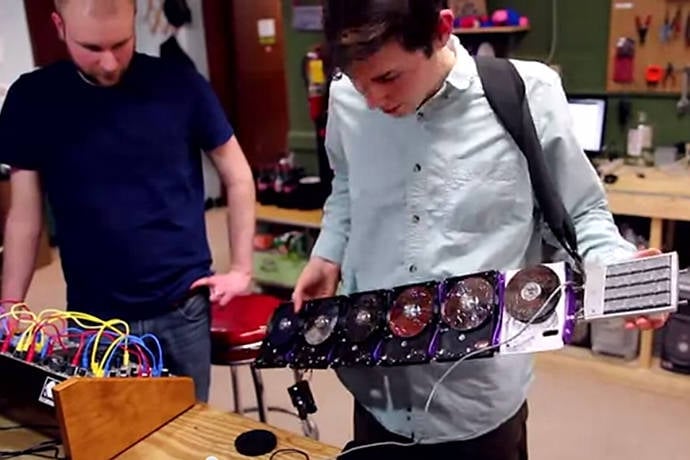Remember shop class in high school? Creating small objects from scrap wood to learn how to use different tools, many of them dangerous to your hands and arms? I also admit to skipping classes in grade school a few times to spend an hour playing in the school junk yard where they had a pile of tossed out electronic parts.
I came across an article about Colten Jackson who has figured out how to rip apart and make music from technology garbage. He’s built a really neat guitar from hard drive disks and a number keypad:
And here’s are short compilations of sounds they’ve gotten from electronic parts:
And here’s someone trying to play the hard drive guitar who isn’t the creator of the device:
There are several amazing things tucked into what he’s done. For example, he found his pieces at a local Makerspace which have become common across the US, possibly elsewhere. Creating music or robots or anything else from scrap electronics would be a natural extension of these public spaces where people (presumably) create more mainstream projects from Arduino, Raspberry Pi, and other non-junk electronics.
It’s also true schools with intrepid science, computer science, and/or music teachers might find it fun to add playing with junk parts to their curriculum. You would have to do a lot of practice to figure out what works and what is a waste of time before you let students loose. You also would have to come up with a bunch of junk parts for materials. Watching this video, however, suggests a basic knowledge of electronics and music are enough to get started.
Third, listening to the music reminded me of the music of John Cage. Much of his music challenges the traditional definitions of music. I could see kids taking this idea — create music from electronic garbage — and really exploring the nature of music. Is music a sustained beat? Are some sounds better than others? Is music making people feel a certain way by playing sounds in a particular order? These are great questions for teachers and students, or any person with time and interest in music.
And last, but not least, creating music from electronic garbage also would be yet another way to teach students how to create questions and find answers on their own. Instead of rote learning, kids would mostly find their own way as they fiddled with parts to make sounds then music. They could work together or by themselves, or a combination.
At least one of these videos mentions Pure Data, a free visual programming language for non-technical people to use to make software programs. There’s a version of the software that lets you pull in libraries of code other people have created, to save time.
Links to more information is below. If you happen to be near Urbana, Illinois (in the US) it’s possible to drop by and play with their equipment. But this sort of project would be a natural for other maker spaces, schools, and anyone with old electronics lying around.
Learn More
Electric Waste Orchestra
http://makerspaceurbana.org/projects/electric-waste-orchestra/
http://www.coolhunting.com/tech/electric-waste-orchestra.php
Colten Jackson on YouTube
https://www.youtube.com/user/CJCruiser/

